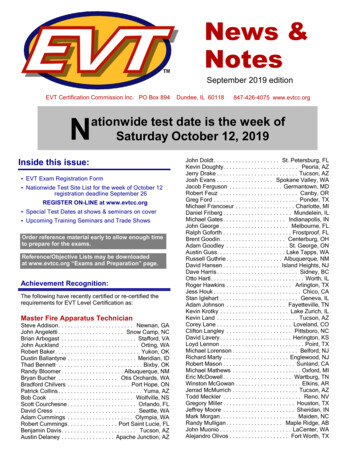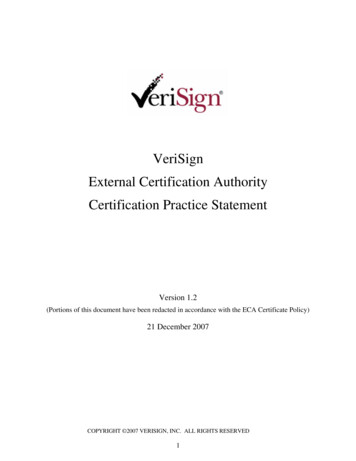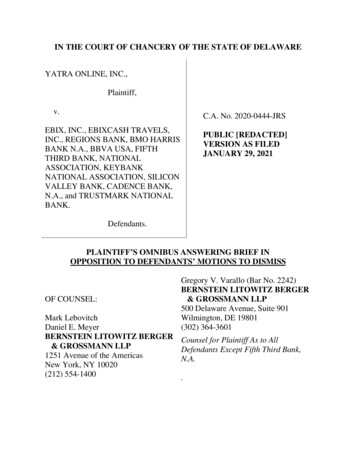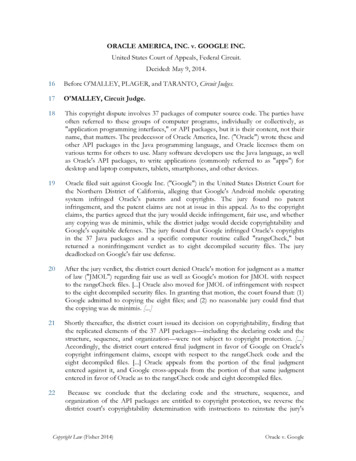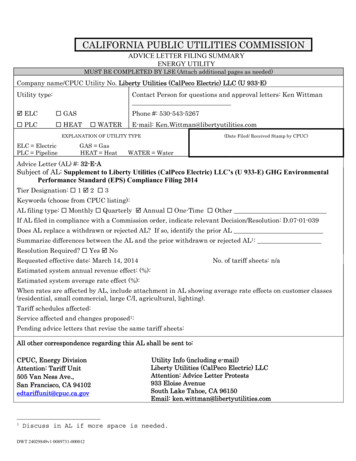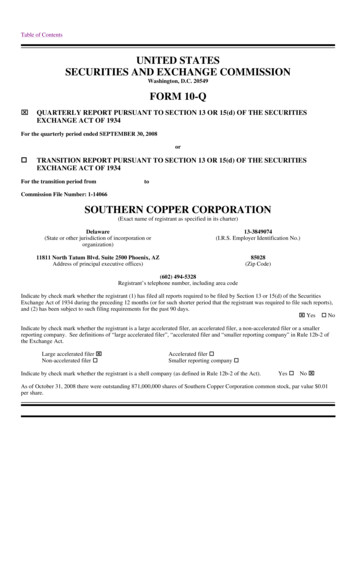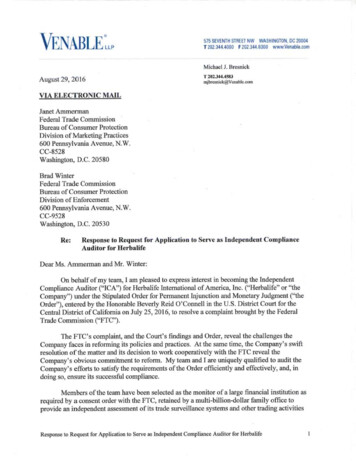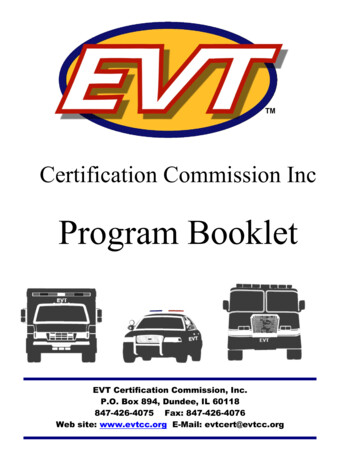
Transcription
Certification Commission IncProgram BookletEVT Certification Commission, Inc.P.O. Box 894, Dundee, IL 60118847-426-4075 Fax: 847-426-4076Web site: www.evtcc.org E-Mail: evtcert@evtcc.org
Emergency Vehicle TechnicianCertification Commission, Inc.Board of DirectorsPresidentKevin RobertsSecretary/TreasurerMichael ThornAssistant SecretaryChristian KoopDirectorsMike BrownAlan ConkleTerry EckertWalter HazeltonCharles MillerStephen WildeMarge WashburnProgram ManagerSherry WildeAssistant ManagerShannon WildeCOPYRIGHT 2020 EVT CERTIFICATION COMMISSION, INC.
Table of ContentsWhy a Certification Program?2What is the EVT Certification Commission?2What Benefits are There to Being Certified?2Who is Eligible?2When & Where are the EVT Exams Administered?2What are the EVT Exams Like?3How to Register for EVT Examinations3Is There a Recertification Requirement?3Who will Know the Results of the Exams?3Tips for Preparing for an EVT Exam3How Does the EVT Certification Program Work?How to Become a Level I, II, or Master EVT Certified TechnicianThe ASE ProgramCanadian Equivalency4444EVT Certification Tracks4Driver Operator Inspection ExamFire Apparatus Technician ExamsFire Apparatus Level Requirements555Ambulance Technician ExamsAmbulance Level Requirements66Airport Rescue and Fire-Fighting Technician ExamsARFF Level Requirements77Law Enforcement Vehicle Technician Exam7Management Exams8List of Mechanic’s Associations, Seminars, and Trade Shows contact information8Exam Registration form9
WHY A CERTIFICATION PROGRAM?The emergency service has always ensured that response and rescue personnel are trained and certified to appropriate levelsbased on “accepted standards,” such as the NFPA standards for firefighters and fire officers. A great deal of emphasis isplaced on maintaining the condition of the apparatus and equipment used by these personnel, but what about the people whomaintain and repair the vehicles and equipment? What level of training have they received to keep a sophisticated piece ofmachinery in proper operating order? Unfortunately, many emergency vehicle technicians are often neglected in emergencyresponse agencies, and in many cases they are part of the cadre of technicians who work on many different types of vehiclesother than emergency vehicles. The emergency vehicle technicians’ need for training, education, and recognition are the sameas it is for emergency response and rescue personnel. However, these needs are often unfulfilled. The EVT CertificationCommission, Inc. was created to help meet those needs.WHAT IS THE EVT CERTIFICATION COMMISSION?The Emergency Vehicle Technician Certification Commission, Inc. (EVT) is a non-profit corporation dedicated to improvingthe quality of emergency vehicle service and repair throughout the United States and Canada. EVT is governed by a Boardof Directors that represents emergency response agencies, emergency vehicle maintenance service associations, and theeducational community. Currently, there are over 7,000 EVT Certified Technicians.EVT began as The Fire Apparatus Mechanics Certification Program, sponsored by the International Association of Fire Chiefs(IAFC). In 1988, the IAFC introduced this certification program in an effort to elevate the standards of emergency vehiclemaintenance and the personnel who perform the work. In addition, the IAFC sought to provide technicians recognition for theeducation, training, and experience they have in the field of service and repair of emergency vehicles. While the IAFC nolonger directly oversees the EVT Certification Program, the IAFC continues to support the continued development andoperation of the EVT Certification Program.The primary function of EVT is to test and certify emergency vehicle technicians. EVT also encourages the development ofeffective training programs which address the training and educational needs of the emergency vehicle technician.WHAT BENEFITS ARE THERE TO BEING CERTIFIED?The benefits of being certified are personal and professional. Being certified as an Emergency Vehicle Technician showsdepartments, governing boards and apparatus service center customers that the technician has proven himself knowledgeablein diagnosing and repairing emergency vehicle mechanical problems. Being certified can potentially mean better pay, increased job opportunity and improved status with the technician’s employer. Certification can increase respect, recognition and credibility in the industry and profession. Technicians will have a nationally recognized certification that may allow both lateral as well as upward movement in thefire apparatus and/or ambulance maintenance field. The servicing of emergency fire apparatus and ambulances by certified technicians will provide more reliable equipment, thusenhancing the safety of the public and emergency personnel. An emergency response agency or vehicle service center employing certified EVT personnel will benefit by havingknowledgeable technicians who are trained to work on emergency vehicles. This will influence the organization*s reputationand customer assurance that quality work will be performed.WHO IS ELIGIBLE?Anyone may register to take the examination. There are no prerequisites to register. The examinations have beenconstructed to identify those who possess the knowledge and skills needed to perform their job. The EVT CertificationProgram is structured for individuals to utilize independent study.WHEN & WHERE ARE THE EVT EXAMS ADMINISTERED?EVT exams are offered twice a year at sites across the country. In addition, many mechanics’ seminars, workshops andschools which offer training in various fields of maintenance have made testing sites available during their activities. Thedates, times and locations of these testing sites can be found on the test site list or by calling the EVT office at 847-4264075 or on the web site at evtcc.org in the “Test Dates and Sites” section.2
WHAT ARE THE EVT EXAMS LIKE?Each regular exam has 85 to 110 multiple-choice questions and each re-certification exam has 25 -35 multiple-choicequestions. The questions are written by a panel of technical experts from the emergency apparatus and ambulanceindustry, certified emergency vehicle technicians, component systems experts and vocational educators.Reference material lists and study objectives, on which the examinations are based, are found later in this pamphlet.These objectives should be used as a basis for preparing to take the EVT examinations. Each individual is encouraged toobtain the reference materials listed and review the objectives to insure that he or she is ready to take an EVT exam.HOW TO REGISTER FOR EVT EXAMINATIONSYou can register online at our web site, www.evtcc.org or complete the EVT Examination Registration Form onpage 9 of this booklet, include payment and mail or fax to the EVT Certification Commission. The registration must bereceived at the EVT office at least 21 days prior to the scheduled exam date. There will be No “Walk-In” registration.Confirmation of exam registration will be mailed to the technician within a week after it is received by the EVT office.Number of tests allowed. Four hours are allotted for each testing date. A time limit of two hours is allowed for eachregular exam and 40 minutes are allowed for each re-certification exam. Any combination of regular and/or re-certificationexams cannot exceed four hours. For instance, two regular exams four hours, or six re-certification exams four hours,or a combination of one regular exam and three re-certification exams four hours.IS THERE A RE-CERTIFICATION REQUIREMENT?YES! Vehicle technology and service techniques are changing rapidly. Technicians must keep up-to-date with modernrepair practices and standards. This program provides an incentive for emergency vehicle technicians to keep theirknowledge and skills current and assures credible proof of one*s ability. Re-certification is an integral part of theEmergency Vehicle Technician Certification Program. The EVT Certification Commission will require the applicant to passthe current EVT re-certification examination every five (5) years.WHO WILL KNOW THE RESULTS OF THE EXAM?A letter will be sent to the technician with exam results. If an exam is not passed, a report identifying areas of knowledgewill be sent. EVT reserves the right to affirm or dis-affirm to its constituents and the public whether the technician does ordoes not hold EVT certification and in what specialty. EVT will not release test scores to any other party in a manner thatthe scores can be identified with a specific technician, unless a written request is received from that technicianRegistration for an EVT exam signifies to the EVT Commission and others that the participant has an interest in elevatinghis knowledge of maintenance and repair of emergency response vehicles. One aspect of EVT's mission is to encourageand assist in the development of maintenance training programs. Accordingly, EVT will use these records to communicatewith the technician, or to facilitate communications by others about education, training, state associations, and awardprograms judged to be of potential benefit to the technician.TIPS FOR PREPARING FOR AN EVT EXAMRegister Early Allow time to obtain reference material, some of the reference material may take several weeks to obtain.Study This is a learning experience. The purpose of this program is to elevate and improve the standards of emergencyresponse vehicle technicians. We recommend you briefly preview the outline of the learning objectives to become familiarwith the topics covered. Then, read each objective carefully. Highlight or underline objectives not known or notunderstood. Look up the items you have highlighted in recommended reference material and refer to other shop manualsto refresh knowledge of proper techniques. Some of the objectives may be hands on/accepted practice type items.How to answer questionsRead each question completely, do not skim or jump to conclusions. Read through all the answers, then choose theanswer that is most correct. Do not leave any question unanswered. A blank answer is counted as a wrong answer.3
HOW DOES THE EVT CERTIFICATION PROGRAM WORK?There are two options for technicians to become certified.Option 1:Technicians may choose to take only EVT exams and become certified in the individual test areas. The technician willreceive an EVT Test Certificate stating the area(s) in which he/she is certified. When a technician passes his first exam hewill receive an “EVT Certified” patch.Option 2:Technicians may choose to obtain the highest EVT Certification by taking a combination of the EVT exams and the ASE(National Institute for Automotive Service Excellence) exams, or the equivalent Canadian Provincial License. LevelCertification will be granted to the technician who successfully completes these requirements. Technicians have the optionof obtaining Level I, II, or Master EVT Technician in the Fire Apparatus, Ambulance Track, and ARFF Vehicle Track.HOW TO BECOME A LEVEL I, II, OR MASTER EVT CERTIFIED TECHNICIANOnce all of the required EVT and ASE exams for Level I, II, or Master have been taken, the technician will need tocomplete the "EVT Certification Level Application Form" and mail with copies of the required ASE or equivalentCanadian Provincial License to the EVT Certification office. ASE or EVT exams may be taken in any order; however,the technician must apply for each level in sequence. For example, Level I requirements would have to becompleted before or concurrent with applying for Level II, or Master.THE ASE PROGRAM - ASE*s primary function is to test and certify automobile technicians and truck technicians. TheASE program consists of a series of written tests given biannually. These tests measure diagnostic and repairknowledge in various technical areas. When a technician passes one or more tests, and has completed two yearsof related work experience, he/she receives documentation for those areas of certification. ASE offers certificationtests in the Spring and Fall each year. Tests are given at locations across the country. For further informationregarding the ASE tests, contact: National Institute for Automotive Service Excellence, 1-877-273-8324Canadian Equivalency - Canada has specific requirements for mechanics. Canadian applicants may substitute copies of aequivalent Provincial License in place of ASE certification to meet the requirements for level certification.EVT CERTIFICATION TRACKSThere are six EVT Certification Tracks Fire Apparatus Technician Track Ambulance Technician Track ARFF Vehicle Technician Track Law Enforcement Vehicle Technician Track Management Track Driver Operator InspectionA description of these tracks can be found on the following pages.4
FIRE APPARATUS TECHNICIAN CERTIFICATION TRACKThis track is for those technicians who service and maintain fire department pumpers, squads, aerial devices, tankers,wild land apparatus, etc. The exams cover design and performance standards, specialized systems and equipment, andaccepted practices used in the service and maintenance of fire apparatus. Reference material lists to prepare for the EVTexams and an outline of the areas to study, “Learning Objectives”, are available online at www.evtcc.org and are mailedat time of registration.Driver Operator Inspection ExamsDO1 Driver Operator 1 InspectionDO2 Driver Operator 2 Inspection- not available at this timeFire Apparatus Technician ExamsLearning Objectives and Reference Materials list for each exam can be downloaded at www.evtcc.org, then click on“exams and preparation”, then scroll down list to the exam(s) you are interested in and print out the page.F-1 Inspection, Maintenance, & Testing of Fire ApparatusF-2 Design & Performance Standards of Fire ApparatusF-3 Fire Pumps and AccessoriesF-4 Fire Apparatus Electrical SystemsF-5 Aerial Fire ApparatusF-6 Allison Automatic Transmissions*FA-4 Advanced Electrical Systems - Pre-requisite requirement of F-4 or E-2*F-7 Foam Systems*F-8 Hydraulic Systems*GL Ground Ladder Testing*Please note that FA-4, F-7, F-8, GL are not required for EVT Level Certification as described belowFire Apparatus Technician Level Certification Requirements ChartLevel IASE Exams:EVT Exams:T-4 Heavy-Duty Truck, BrakesT-5 Heavy-Duty Truck, Suspension and SteeringF-1 Inspection, Maintenance & Testing of Fire ApparatusF-2 Design & Performance of Fire ApparatusLevel IIASE Exams:EVT Exams:T-2 Heavy-Duty Truck, Diesel EnginesT-3 Heavy-Duty Truck, Drive TrainT-6 Heavy-Duty Truck, Electrical SystemsF-3 Fire Pumps and AccessoriesF-4 Electrical SystemsMaster Level IIIASE Exams:T-1 Heavy-Duty Truck, Gasoline EnginesT-7, Heating and Air-ConditioningEVT Exams:F-5 Aerial Fire ApparatusF-6 Allison Automatic Transmissions5
AMBULANCE TECHNICIAN CERTIFICATION TRACKThis track recognizes that some technicians work only on ambulances. The exams cover the design and performancestandards, the specialized systems and equipment, and the accepted practices used in the service and maintenance ofambulances. Reference material lists to prepare for the EVT exams and an outline of the areas to study, “Learning Objectives”,are available online at www.evtcc.org and are mailed at time of registration.Ambulance Technician ExamsLearning Objectives and Reference Materials list for each exam can be downloaded at www.evtcc.org, then click on “examsand preparation”, then scroll down list to the exam(s) you are interested in and print out the page.E-0 Inspection, Maintenance, & Testing of AmbulancesE-1 Design & Performance StandardsE-2 Ambulance Electrical SystemsE-3 Ambulance Heating, Air-Conditioning, and Ventilation SystemsE-4 Ambulance Cab, Chassis, and PowertrainAmbulance Technician Level Requirements ChartLevel IASE Exams:A-4 Automobile, Suspension and SteeringA-5 Automobile, BrakesEVT Exams:E-0 Inspection, Maintenance, & Testing of AmbulancesE-1 Design and Performance of AmbulancesLevel IIASE Exams:A-9 Automobile, Diesel EnginesT-3, Heavy-Duty Drive TrainT-4 Heavy-Duty Truck, BrakesEVT Exams:E-2 Ambulance Electrical SystemsE-3 Ambulance Heating, Air-Conditioning, & VentilationMaster Level IIIASE Exams:T-1 Heavy-Duty Truck, Gasoline EngineT-2 Heavy-Duty Truck, Diesel EnginesT-5 Heavy-Duty Truck, Suspension and SteeringEVT Exams:E-4 Ambulance Cab, Chassis and Powertrain6
AIRPORT RESCUE AND FIRE-FIGHTING TECHNICIAN LEVEL CERTIFICATION TRACKThis track program recognizes technicians who work on airport rescue and fire-fighting vehicles. The exams cover the designand performance standard and preventive maintenance, chassis and vehicle performance, and the extinguishment systemsof ARFF vehicles. Reference material lists to prepare for the EVT exams are shown in the description of each exam. An outlineof the areas to study, “Learning Objectives”, are available online at www.evtcc.org and are mailed at time of registration.ARFF Technician ExamsLearning Objectives and Reference Materials list for each exam can be downloaded at www.evtcc.org, then click on “examsand preparation”, then scroll down list to the exam(s) you are interested in and print out the page.A-1 Design & Performance Standards & Preventive Maintenance of Aircraft Rescue & Fire-Fighting VehiclesA-2 Chassis and Vehicle Components of Aircraft Rescue and Fire-Fighting VehiclesA-3 Extinguishment Systems of Aircraft Rescue and Fire-Fighting VehiclesAIRPORT RESCUE AND FIRE-FIGHTING TECHNICIAN LEVEL REQUIREMENTSLevel IASE Exams:T-2 Heavy-Duty Truck, Diesel EngineT-4 Heavy-Duty Truck, BrakesT-6 Heavy-Duty Truck, Electrical/Electronic SystemsEVT Exams:A-1 Design and Performance of ARFF VehiclesF-1 Inspection, Maintenance, & Testing of Fire ApparatusLevel IIASE Exams:T-3 Heavy-Duty Truck, Drive TrainT-7 Heavy-Duty Truck, HVACT-5 Heavy-Duty Truck, Suspension/SteeringEVT Exams:A-2 Chassis & Vehicle Components of ARFF VehiclesF-4 Fire Apparatus Electrical SystemsMaster Level lllASE Exams:L-2 Electronic Diesel Engine Diagnosis SpecialistEVT Exams:A-3 Water/Foam and Ancillary Extinguishment SystemsLAW ENFORCEMENT VEHICLE TECHNICIAN LEVEL CERTIFICATION TRACKThe Law Enforcement Vehicle Technician track program recognizes that some technicians work only on law enforcementvehicles. The exam covers the design and performance standards, installation of the specialized systems and equipment,and the accepted practices used in the service and maintenance of Law Enforcement Vehicles. A reference material list toprepare for the EVT exam is shown in the description of the exam. An outline of the areas to study, “Learning Objectives”,are available online at www.evtcc.org and are mailed at time of registration.Law Enforcement Vehicle Technician ExamL-1 Law Enforcement Vehicle Installation TechnicianLearning Objectives and Reference Materials list for each exam can be downloaded at www.evtcc.org, then click on“exams and preparation”, then scroll down list to the exam(s) you are interested in and print out the page.MANAGEMENT CERTIFICATION TRACKA reference material list to prepare for the EVT exam is shown in the description of the exam. An outline of the areas tostudy, “Learning Objectives”, are available online at www.evtcc.org and are mailed at time of registration.Management ExamsLearning Objectives and Reference Materials list for each exam can be downloaded at www.evtcc.org, then click on“exams and preparation”, then scroll down list to the exam(s) you are interested in and print out the page.M-1 Level 1 Supervisor ExamM-2 Level 2 Supervisor Exam7
EVT Certification Commission, Inc. encourages organizations that promote training for the emergency vehicle technician. Listed beloware organizations that are of interest to the emergency response vehicle technician Many of the seminars and shows provide theopportunity to sit for EVT Certification exams. Check the test site list for dates and times or visit the EVT web site at www.evtcc.orgEmergency-One-Ocala, F
EVT Certification Commission, Inc. P.O. Box 894, Dundee, IL 60118 847-426-4075 Fax: 847-426-4076 Web site: www.evtcc.org E-Mail: evtcert@evtcc.orgFile Size: 619KB
